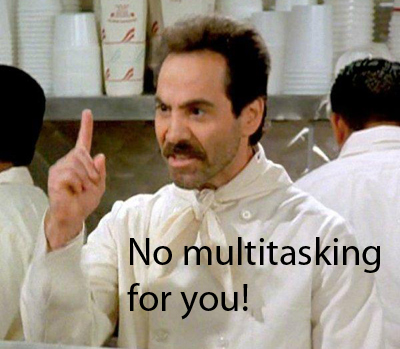
How often do you read job descriptions, which require candidates to be able to multitask? Perhaps, as a manager, you are the one who demands this ability from your future and current employees.
Wrong! Multiple research studies demonstrate that, much like earlier CPUs, human brains process information serially. When engaged in multitasking we actually switch back-and-forth between two or more tasks while doing only one task at a time. This comes at high switching costs and a significant detriment to productivity and quality. Habitual multitaskers often complain that they “need to do five things at once because they do not have time to do them one at a time”. However, in actuality, they would have completed their assignments much faster if they were to finish task one before starting task two, etc. The difference in productivity has been shown to be as high as 40%.
A study from the University of London showed a decline in IQ as high as 15 points. Interestingly, while both genders performed badly in multitasking, men were reported to be worse than women. A 2014 study by researchers from the University of Sussex indicated that the brain damage could be permanent. Subjects who frequently engaged in media multitasking, such as watching TV while checking their phones, were shown to have lower brain density in the anterior cingulate cortex, an area of the brain involved in problem solving, concentration upon a task and emotion regulation.
David Sanbonmatsu and David Strayer from University of Utah concluded that people’s perception of their own ability to multitask was strongly inflated. In fact, folks who multitask frequently, and consider themselves good multitaskers, have the lowest multitasking abilities. This includes people who drive while talking on the phone.
Similarly, Stanford University researchers, Eyal Ophira, Clifford Nassb, and Anthony D. Wagner discovered that heavy media multitaskers performed worse on a test of task-switching ability (a.k.a. multitasking), likely due to reduced ability to filter out interference from the irrelevant information.
References
Kep Kee Loh, and Ryota Kanai (2014). Higher Media Multi-Tasking Activity Is Associated with Smaller Gray-Matter Density in the Anterior Cingulate Cortex. PLoS One
David M., Strayer, David L. Medeiros-Ward, Nathan, Watson. Jason M. (2013). Who Multi-Tasks and Why? Multi-Tasking Ability, Perceived Multi-Tasking Ability, Impulsivity, and Sensation Seeking. PLoS One
David L. Strayer, Jason M. Watson, and Frank A. Drews, (2011). Cognitive Distraction While Multitasking in the Automobile. The Psychology of Learning and Motivation, Vol. 54
Eyal Ophira, Clifford Nassb, and Anthony D. Wagnerc (2009). Cognitive control in media multitaskers Proceedings of the National Academy of Sciences of the United States of America
Leave a Reply